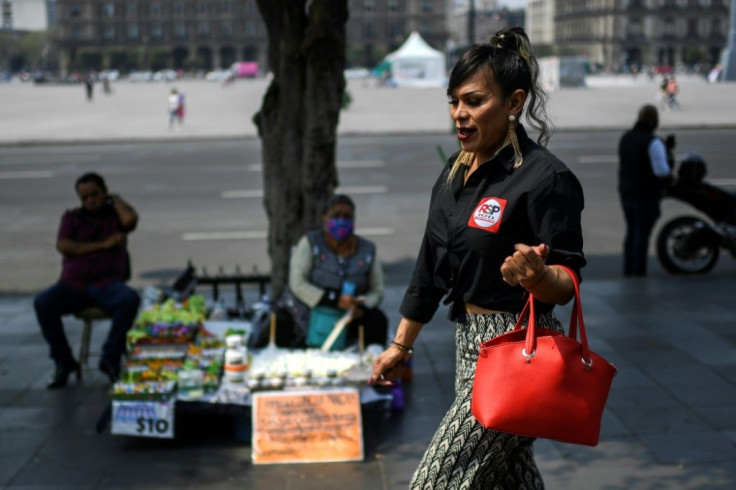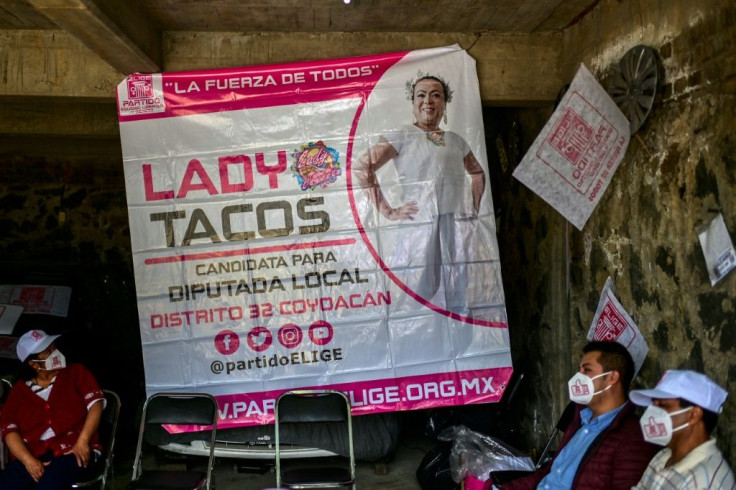Trans Candidates Fight For Rights In Mexico Election
Fighting discrimination, challenging stereotypes and striving for greater rights for the LGBT community, dozens of Mexican transgender candidates are seeking political empowerment in midterm elections next month.
Lady Tacos de Canasta, an indigenous street food vendor who identifies as a muxe, the third gender of the Zapotec ethnic group, is among those running for office.
She gained recognition after standing up to the police who tried to stop her selling her tacos in the streets of Mexico City, and featured in the Netflix documentary Taco Chronicles.
The 36-year-old, who hopes to win a seat in the capital's legislative assembly, wants to improve health services for the lesbian, gay, bisexual, and transgender community, and also ensure protection for street vendors.
"Either you suffer under the yoke all your life or you refuse to be persecuted for who you are," Lady Tacos said.

Lady Tacos, from the southern state of Oaxaca, will appear on the ballot under her given name of Juan Francisco Martinez as a candidate of the Equity, Freedom and Gender Party.
"I think we already won. We have already opened this door, which is what we wanted," she said.
On June 6, Mexicans will elect 500 members of the lower house of Congress, the Chamber of Deputies, as well as 15 state governors and around 20,000 local politicians.
Around 40 transgender candidates are running for the Chamber of Deputies alone.
So far only one transgender person, Rubi Araujo, has been elected to public office in Mexico, as a municipal councilor in the central state of Guanajuato in 2016.

In the northwestern state of Zacatecas, 34-year-old Fernanda Perera of the Progressive Social Networks party aims to become the country's first transgender governor.
Among her political goals, she wants Mexicans to be able to change their names and gender in official documents, a right so far recognized in only 13 of 32 states.
"We face marginalization and rights violations everywhere," said the candidate, describing the situation as like being "invisible" in the eyes of the law.

"We are showing that we are like any other person, that we are like any citizen," Perera said.
Life expectancy for transgender people in Mexico is 35 years due to the violence they face, according to the Inter-American Commission on Human Rights, compared with 77 for the general population.
Mexico is the second deadliest country for transgender people after Brazil, according to the advocacy groups Letra S and Transgender Europe.
In an effort to bring about change, the National Electoral Institute requires political parties to include indigenous, disabled and gender diverse people among their candidates.
But LGBT activists have complained to the electoral authorities that one party, Fuerza por Mexico, nominated 18 men as trans candidates to fulfill the quota in the central state of Tlaxcala.
"Not only did they violate the guidelines, they also mocked the historic debt with the LGBT community," said Lucia Riojas, a lower house lawmaker.
Valeria Lorety, a 36-year-old stylist, said she had to fight a tough battle to become a candidate for mayor of Zacatelco in Tlaxcala.
"It was very complicated because in other parties there was a lot of discrimination against my participation," she said.
She finally succeeded with the Ecologist Green Party of Mexico.
Determined to break stereotypes, Lorety feels that just getting her name on the ballot is an achievement.
The push for greater political empowerment reflects a trend seen elsewhere in the region such as in Ecuador, where transgender politician Diane Rodriguez was elected to the National Assembly in 2017.
In Brazil, Erika Hilton last year became the first black trans woman elected to the municipal legislature, winning the most votes of any woman in the country in November elections.
Transgender people are beginning to occupy a place on the political spectrum that was "inevitable," Lorety said.
"The fact that we are trans women doesn't stop us from being able to raise our hands," she added.
© Copyright AFP {{Year}}. All rights reserved.





















